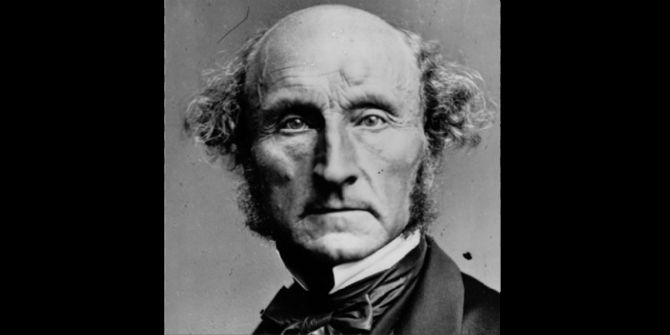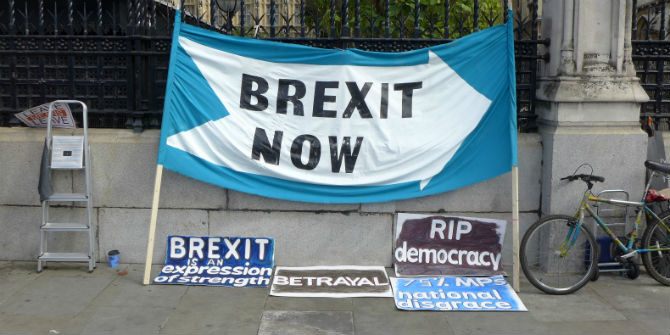 This week marks the 20th anniversary of the Belfast (Good Friday) Agreement. Katy Hayward (Queens University Belfast) considers the current debate about whether Brexit is a threat to peace and stability in Northern Ireland. She argues that the obsession with avoiding physical infrastructure at the border represents a very limited view of where risks to the peace process might come from.
This week marks the 20th anniversary of the Belfast (Good Friday) Agreement. Katy Hayward (Queens University Belfast) considers the current debate about whether Brexit is a threat to peace and stability in Northern Ireland. She argues that the obsession with avoiding physical infrastructure at the border represents a very limited view of where risks to the peace process might come from.
Hours after people of all political persuasions – unionist and nationalist, conservative and socialist, leavers and remainers – gathered in Belfast to commemorate the 20th anniversary of the Belfast (Good Friday) Agreement, how determinedly counter-current for Daniel Hannan to have this piece published in the Sun. Hannan took the warnings from the Agreement’s architects about the present risks posed to it and interpreted them thus: ‘Remainers don’t really care about Ireland… they just want to stop Brexit’.
The most striking thing about this piece is that a Conservative MEP could bend an ear to the expression of anxieties in Belfast and decide to hear them as “shrill” and disingenuous remoaning. In so doing, he aptly displays the attitude that fuels such fears.
For the narrative and drive towards ‘Brexit at any cost’ naturally raises questions as to the price that might be paid for this ambition. As Hannan himself notes at the end of his article, Brexit could come at the cost of making trade ‘harder’. It could conceivably come at a cost to the Union. It could also come at a cost to the peace process.
Far from being the preserve of Europhiles, warnings about the stability of peace in Northern Ireland have come from all quarters. Even David Trimble – whom Hannan lauds in this article – has pointed to the risk of provoking violence through Brexit (in this case, from loyalists in reaction to Dublin’s stance).
Even if Hannan is right and all sides are cynically exploiting the ‘fragile peace’, it is worth asking: what is the intended purpose of such warnings? Put most simply, unionists want to warn the Irish government about the consequences of their actions; nationalists want to do the same to the British government.
Warnings of provoking violence or civil disquiet are still a means by which politicians in Northern Ireland force the British and Irish governments to pause for thought. You don’t have to believe in the imminent end of loyalist and republican ceasefires to see that this situation is a sign of severe sickness in the democratic peace in Northern Ireland.
Why should the avoidance of public disorder be what motivates government policy rather than, say, the bolstering of the middle ground, the prosperity of the economy, the erosion of sectarianism or the ending of the ‘brain drain’ through high levels of school leaver and graduate emigration? Because the spectre of armed violence is a tactic that works when it comes to shaping government policy towards Northern Ireland.
The current approach to the Brexit ‘border issue’ exemplifies this all too well. See, for instance, the UK government’s narrow interpretation of a ‘hard Irish border’ to mean one with physical infrastructure. This is a direct outworking of its wish to not have anything on the border that republican paramilitaries can take potshots at. The working assumption appears to be that violent conflict can be averted merely by not having obvious targets for that violence. But, of course, the source of the risk isn’t that republican paramilitaries particularly detest ANPR cameras. Nor would they only object to border checks if they were to occur within spitting distance of ‘the legal border’.
The escalation of violence and securitisation at the Irish border during the Troubles was intrinsically connected to what was happening elsewhere in Northern Ireland – internment, expulsions, atrocities. The principle of the border as a bellwether remains true today. Whether the border is a point of cooperation or conflict is determined by much broader policies and practices, all the way up to those of the two governments. For what allows paramilitary groups to prosper but the failure to create the conditions that prove ‘exclusively democratic and peaceful means’ to be the best way to pursue political goals?
 © Copyright Rossographer and licensed for reuse under this Creative Commons Licence.
© Copyright Rossographer and licensed for reuse under this Creative Commons Licence.
The Secretary of State assured us on the anniversary of the Agreement that restoring devolution in Northern Ireland was the government’s ‘number one political priority’. Unfortunately, there is, at the moment, far too little publically-available evidence to support this claim. Brexit has dominated the political priorities of the British government since Article 50 was triggered. It has not only driven the government’s agenda, but it has also caused it to contract. Whether the Prime Minister’s habit of dizzyingly-whirlwind visits to Northern Ireland arises from her lack of time, comfort or interest, Brexit is undoubtedly a contributing factor.
This is such a pity because, in this context, Brexit should really not be that important. In Northern Ireland, the landscape of democracy and sovereignty, identity and borders is not primarily defined by EU membership. It is defined by peace. Or by conflict.
The future of this place does not lie in the hands of paramilitaries. Nor can it rest in the hands of one political grouping to the exclusion of others. A future for this place lies in the quality of democracy, trust and cooperation across the three ‘strands’ of the Agreement: unionist/nationalist, north/south, British-Irish.
This is an appropriate time to recall the commitment made in the Agreement to ‘partnership, equality and mutual respect as the basis of relationships’. Partnership, equality and mutual respect are not merely civilising principles for a post-conflict region; they are qualities for MLAs, MPs and MEPs of all parties to uphold and to demonstrate in relationships across these islands. If they really care about Northern Ireland, that is.
This article gives the views of the author, not the position of LSE Brexit or the London School of Economics.
Katy Hayward is a Senior Lecturer in Sociology at Queen’s University Belfast.







Is ‘Who really cares about Northern Ireland’ a rhetorical question?
If it isn’t, it’s easier to answer a question about ‘Who doesn’t care’. The British government and the people of Great Britain mostly don’t care. They would much prefer if the NI problem would simply go away and not bother them anymore. They have all forgotten — or never knew — that much of the Irish Problem came from their interference.
The Irish Government cares for NI; not just because of any threat to peace, but for trade. Likewise the EU.
A nicely written piece. Rehearsing accurately all of the political paths necessary to take for the possibility of a truly democratic system based in social justice and human rights equality. One which would not encourage the young and the bright to continue to flee the place annually, in the thousands. Or for thousands more to suffer year after year of insult added to injury by their local politicians and the British government, as the judicial investigation of the violent atrocities perperated in the past continues to be bizarrely ‘delayed’.
To even begin to approach this reality now, the groupthink amongst local and international political and academic players involved in the GFA of 20 years ago, and the many who are still benefitting professionally from this extraordinary legal feat of goodwill, of barefaced denial of the heinous lack of any cultural vision and courageous socially inclusive leadership ever since, has to bloody well stop. Enough is enough.
Either admit these awful mistakes and step up to the plate or, echoing the words of PSNI chief constable George Hamilton in reference to the statement made by the still ubiquitous terrorising criminal loyalist paramilitaries leadership that continues to flourish across this Province, that they will now ‘obey the rule of law’, don’t try to fob all of us off with any more patronising weasel words, get on with it, or please ‘just go away’. We are exhausted with your decades of false promises and criminal negligence.
Timely reminder of the wider context of the Border, which in its own way memorialises Partition. Regrettably, Barry Gardiner also ignores the wider picture in his own peculiar take on ’cause and effect’ of conflict in Ireland.
Brexit will bring back the bad old days not te god old days
People care about things that they hear about all the time. In the ROI we get constant news coverage of Northern Ireland politics, its our only land neighbour after-all. We get BBC Northern Ireland with local news and shows like Nolan Live; I challenge anyone to watch last Tuesday’s show and not agree that there is a delicate ongoing peace process. Brexit has put Britain and Ireland on opposite sides of the negotiating table, and it’s a emotive issue. British politicians and media are constantly accusing Ireland of ulterior motives. I particularly hate the British allegation that Ireland is conspiring for a United Ireland. That would be entirely Northern Ireland’s decision. Anyway I honestly cannot imagine a circumstance in which there would be a United Ireland in the next decade, so who cares.
A border in Northern Ireland would be devastating for the peace process. It would also harm border communities in the ROI, and lead to increased smuggling and criminality. Although Ireland talks about it less, a border in the Irish Sea would also be devastating for the peace process. The EU and Irish proposal of Northern Ireland remaining in the Customs Union and Single Market is ridiculous, but it’s the least ridiculous proposal in the circumstances. It not like we can propose what would be a realistic option, that the entire UK remain in the Customs Union and Single Market, that’s a British decision to make. Ireland will not tolerate a land border, it’s up to Britain to not tolerate a Sea Border.
I honestly cannot imagine a circumstance in which there would be a United Ireland in the next decade
The consequences flowing from Brexit might be the catalyst, John.Things can move faster than people expect.
1989. Thatcher tells Gorbachev: “We do not want a united Germany”.
1990. http://www.nationalarchives.gov.uk/uploads/2016/12/PREM19-3002-Germany.jpg
I just think relations between Ireland and Britain, and Ireland and Unionists are at a real low and will take quite some time to repair. Until then a United Ireland, if it were to happen, would probably be a disaster. While I think the Irish government has done an excellent job on Brexit, I do appreciate why things like the backstop option have been rather provocative. To be honest the backstop option only truly makes sense, if you think the British red lines are utterly ridiculous, which quite frankly I personally think they are.
nice article Katy, there are already important signs of the destabilising impact of not having Dublin and London inside a common European Union framework for governing this place.